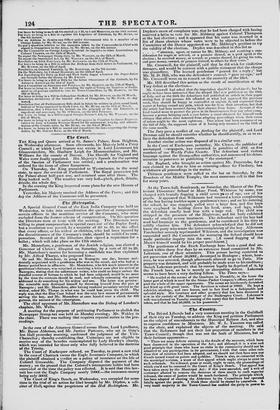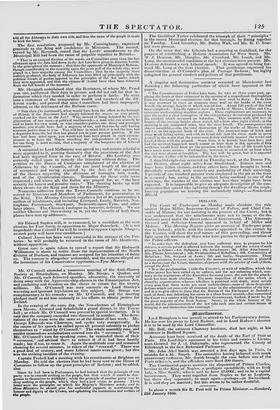Ely Country.
The Bristol Liberals had a very numerous meeting in the Guildhall of their city on Tuesday, to address the King and petition Parliament on the subject of amendments to the Municipal Reform Act, and also to express confidence in Ministers. Mr. W. L. Taunton was called to the chair, and explained the objects of the meeting. He said that the Reformers had not their fair proportion of members in the Town-Council ; though that was not the fault of Ministers, but of their factious opponents-
" There are many defects existing in the details of the measure, which have been discovered in the operation of the Act; and although it is a wise and good principle that these who have no stake in the community should not be admitted to any participation in its government, I wish that some other rule than that of taxation hail been adopted, and we should not then have seen elm friends turned round on points and quibbles. There is also, as connected with the municipal revision, a want of that appeal which ought always to exist in such tribunals. No tribunal, great or small, ought to exist, the proceedings of which cou'd not be removed to the Court of King's Bench. That appeal has been taken away by the Municipal Act : if this were amended, and a writ of certiorari allowed to remove the decisions of these courts to such superibr tribunal, the cause of justice would be much furthered. The principle which has been adopted of electing the Aldermen by the Councilmen had operated fatally against the people. I think these should be elected by yourselves. A very small majority in the Town-Council has enabled the party in power to,
add all the Aldermen to their own side, and thus the cause of the people is made to kick the beam."
The first resolution, proposed by Mr. Cunningharne, expressed gratitude to the King and confidence in Ministers. The second, moved by Mr. Herapath, stated that the Lords' amendments to the Municipal Bill had been the cause of palpable injustice to Bristol-
" That in an unequal division of the wards, six Councillors more than the fair allotment upon the data laid down in the Act have been given to districts hostile to the principles of the measure ; that thus the opponents of Municipal Reform, though considerably in the minority upon the gross poll of the whole city, were placed in a bare majority among the Councillors ; that by the majority thus unfairly produced, the body of Aldermen has been filled up principally with the political friends of parties opposed to the principles of the Act under which they were appointed, and that the citizens df Bristol have thus been debarred from the full benefit of the measure."
Mr. Herapath complained that the Barristers, of whom Mr. Praed was one, performed their duty in private, and did not call for that in- formation which they needed in order to perform it fairly. He went into a statement of the comparative wealth and numbers of the dif- ferent wards; and proved that nine Councillors bad been improperly allotted, to the detriment of the Reform cause.
" Now then (he continued), what would have been the effect in the borough of Bristol, if the Barristers had simply followed the course so very plainly marked out for them in the Act? Why, instead of being defeated by the ter- giversation of one man—a political weathercock—a man who can scarcely. be said to know his own mind, or who considers politics one thing and principle another, you would have had a majority of ten, and that too by only having justice ustice done to you. You will bear in mind that it is not the law, but a departure from the law that has placed you in your present position. If the law had been acted upon, you would not have been placed in such circum- stances as to have the Mayor attacking the independence of the Court; for one thing is most certain, that a majority of the burgesses are of Liberal sentiments."
A memorial to Lord Melbourne was agreed to; and certain schedules were appended to it, proving distinctly that the provisions of the Act bad been departed' from in the case of Bristol. His Lordship was earnestly called upon to remedy the injustice without delay. The petition to the House of Commons complained of the election of Aldermen by the Councils, of the too great length of the period of occupancy and rating required by the Act, of the operation of the clauses respecting the divisions of boroughs into wards, and of the Qualification-clauses. Remedies for these evils were requested ; and above all, the Ballot was prayed for, as " the best security for honest and genuine votes." The meeting broke up with three cheers for the King and three for the Ministry. Numerous addresses from the Town-Councils continue to be re- ceived by Ministers and Members of Parliament, for presentation to the King. The Morning Chronicle supplies a list of 38, representing a million of inhabitants, and including Liverpool, Leeds, Norwich, Not- tingham, Portsmouth, Stockport, Newcastle-upon-Tyne, and other large places. The, Chronicle catalogue is, however, deficient. We see neither Chester nor Shrewsbury in it, yet the Councils of both these places have sent up addresses.































 Previous page
Previous page